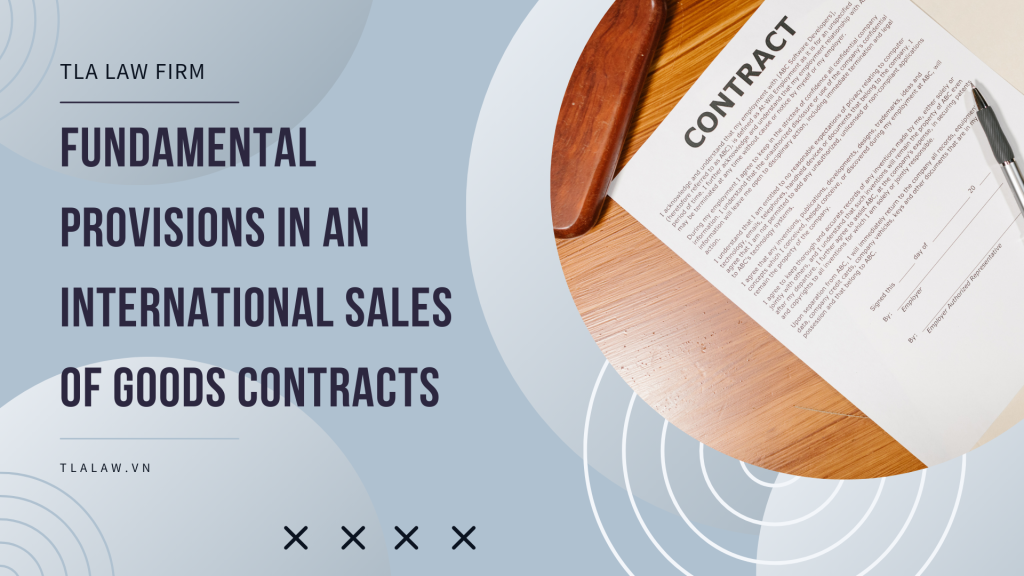
With global economic integration, international trade is booming, making sales of goods contracts increasingly vital. In Vietnam, these contracts dominate international commerce, as service transactions involving intellectual property remain limited. What defines these contracts, and what key clauses should businesses know? Let’s find out below.
1. What is an international sales of goods contract?
An international sales of goods contract is an agreement between parties, whereby the seller is obligated to transfer ownership of goods, and the buyer is obligated to pay for them as agreed. The distinctive feature of such contracts is that the parties involved have their commercial establishments located in different countries, and the transaction is typically governed by international or national laws of one or more parties.
Pursuant to Article 430 of the Civil Code 2015, a sales contract is an agreement where the seller transfers ownership of the property to the buyer, who, in turn, fulfills their payment obligation. For international trade, this definition is extended to include obligations related to transportation, insurance, and customs procedures.Furthermore, the Commercial Law 2005 provides more detailed regulations regarding the rights and obligations of parties in commercial transactions, serving as a critical legal framework for businesses entering international sales of goods contracts.
2. Fundamental provisions in international sales of goods contracts
An international sales of goods contract must be meticulously crafted with the following fundamental provisions to safeguard the rights and obligations of the parties involved:
(1) Product name and description
Goods must be described in detail, including trade names, technical codes, or other identifying characteristics. If the contract covers multiple goods, a detailed list (annex to the contract) should be attached.
(2) Quantity and measurement unit
The quantity of goods must be explicitly defined, accompanied by an appropriate measurement unit. For goods whose weight might vary due to factors such as humidity or evaporation, the parties should agree on a tolerance rate or method of determination.
(3) Product quality
The quality of goods may be determined through:
- Sample products.
- International standards or technical specifications.
- Guidelines or certifications from competent authorities.
Additionally, the location and method for quality inspection should be agreed upon before delivery.
(4) Delivery time and location
Delivery terms are often defined according to INCOTERMS (e.g., CIF, FOB). The delivery location is critical as it impacts shipping costs, insurance, and the responsibilities of the parties.
(5) Price
The price must be clearly specified, typically in foreign currency, and based on the delivery terms. Ambiguous pricing may render the contract invalid.
(6) Payment
Two common payment methods in international sales contracts are:
- Collection of payment: The seller authorizes a bank to collect payment from the buyer based on presented documents.
- Documentary credits (L/C): A bank guarantees payment upon receipt of compliant documents.
Moreover, the payment deadline must be clearly defined to avoid risks.
(7) Packaging
Packaging must suit the nature of the goods and comply with the legal requirements of the importing country. This ensures safety during transportation and mitigates risks when goods fail to meet technical specifications.
(8) Applicable law and dispute resolution
Parties may mutually agree on the governing law, typically the seller’s or buyer’s national law, or that of a third country. Dispute resolution methods include negotiation, mediation, or litigation/arbitration.
(9) Liability for breach of contract
In the event of a breach, the violating party must compensate for damages unless the breach is caused by force majeure. Exemption clauses should be clearly outlined.
3. Obligations of Parties in the contract
Obligations of the Seller
- Deliver goods on time, in the agreed quantity and quality.
- Provide related documents.
- Ensure ownership and intellectual property rights over the goods.
Obligations of the Buyer
- Make payments on time.
- Accept goods at the agreed time and place.
- Inspect goods if agreed upon in the contract.
International sales of goods contracts are not only critical legal tools in commercial transactions but also help businesses protect their interests and minimize risks in cross-border trade. We hope this article provides valuable insights to support businesses and individuals in executing international sales of goods contracts effectively.
Contact Our Legal Experts
At TLA, our experienced lawyers specialize in diverse legal fields, including criminal, civil, corporate, and family law. We provide comprehensive legal support and personalized advice.
For Expert Legal Consultation, Contact Us:
1. Lawyer Vu Thi Phuong Thanh – Director of TLA Law Firm, Hanoi Bar Association.
Email: vtpthanh@tlalaw.vn
2. Lawyer Tran My Le – Chairwoman of TLA Law Firm’s Members’ Council, Hanoi Bar Association.
Email: tmle@tlalaw.vn
Address: Floor 7, No. 6 Duong Dinh Nghe Street, Yen Hoa, Cau Giay, Hanoi
Website: https://tlalaw.vn/
Hotline: 0906246464
_LTTTra_

